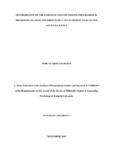DETERMINANTS OF THE GUIDANCE AND COUNSELING PROGRAMME IN PROMOTING HEARING IMPAIRED PUPILS’ DEVELOPMENT IN SELECTED COUNTIES, KENYA
Abstract
Hearing impaired children encounter many challenges which are caused by their inability to hear and effectively use oral language. This has serious implications on their personal, social, educational and career development. This calls for well coordinated and informed interventions so as to provide hearing impaired learners with competences to enable them to live effective lives and develop into responsible citizens despite their handicap. An effective guidance and counseling programme will be determined by teacher counselors and the school administration working together in addressing issues that affect hearing impaired pupils at home, school and later in life thus enabling them to enjoy life like the hearing people. If proper guidance and counseling interventions are put in place, the hearing impaired pupils will achieve their highest potential in life. Therefore the purpose of this study was to explore the determinants of the guidance and counseling programme in promoting the hearing impaired pupils’ development in primary schools in the counties of Nakuru, Nairobi, Kiambu and Machakos. These counties have nine primary schools with a population of 776 hearing impaired pupils, 90 teachers and nine head teachers of the schools. The study was a descriptive survey that adopted an ex-post facto research design. Purposive sampling, proportionate stratified sampling and simple random sampling techniques were used to select the participants who comprised 152 pupils in class six to eight, 12 teacher counselors and four head teachers. Data collection instruments were questionnaires and interviews. A Pilot study was conducted in two schools in Nairobi. 20 pupils, six teacher counselors and two head teachers of the schools participated. Reliability co-efficient of 0.77, 0.7 and 0.71 for the pupils’ questionnaire, teacher counselors’ questionnaire and head teachers’ interview guide were obtained respectively. The data collected was analyzed using the Statistical Package for Social Sciences (SPSS) version 22 for windows. Data was analyzed using frequencies, percentages and chi-square test to establish whether there was a significant relationship between guidance and counseling programme and the hearing impaired pupils’ development. The study established that the guidance and counseling programme was playing a significant role in assisting hearing impaired learners deal with personal, social and educational challenges except for career development. However some teacher counselors did not have adequate training and physical resources for the guidance and counseling programme was a challenge. School administration did not also offer adequate support. It was also established that parents did not cooperate with the teacher counselors to ensure overall development of the hearing impaired child. The study recommended that stakeholders and policy makers in education ensure adequate training of teacher counselors to enable them deal effectively with critical issues that affect learners with hearing impairment. Head teachers need to provide required resources for the guidance and counseling programme to ensure full implementation and schools should purpose to create awareness to parents with hearing impaired child on the importance of partnering with them in ensuring overall development of the children through the guidance and counseling programme.

